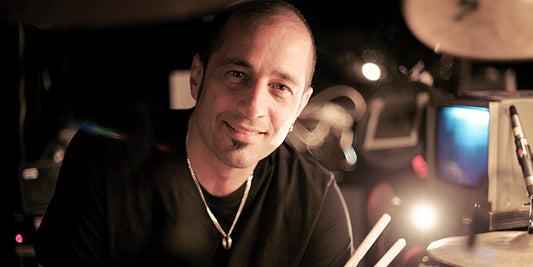
On Being a 'Go-To' Drummer for Broadway
By Rich Rosenzweig
I, personally, did not aspire to be a Broadway show drummer.
I was, however, lucky in having parents who took advantage of our being a “Jersey ‘burbs” family - and as an impressionable tyke, they exposed me to the amazing array of culture across the Hudson River in New York. But being chaperoned to orchestra concerts, the Barnum and Bailey Circus, and dozens of Broadway shows eventually gave way to teenhood - and that meant hitting rock concerts and jazz clubs on my own, with friends. Having played drums since the age of 11, eventually the idea of being able to express myself as a jazz drummer became the ‘dream’.
But once out of college and living in New York, the ‘reality’ was that making a living meant playing weddings, bar-mitzvahs, regional musical theater, and occasional short tours out of town. Jazz gigs were there, but not in my future as my main source of income. I needed a plan; a way to focus my energies towards making a living as a drummer, but avoiding the drudgery - that was for me - of playing club dates. Since I always enjoyed playing musicals, the lure of Broadway, (though it was becoming more competitive by the year) seemed like my best shot to becoming a ‘career musician’.
So I’ll humbly offer my own thoughts on what it takes to be that reliable, badass player that conductors and contractors ask for - and hopefully ask back.
Perhaps you’ve read elsewhere, or have been learning on you own, what comprises being a good “Musical Theater Drummer”. So I’ll humbly offer, having experienced the journey from summer stock to dinner theater, from bus & truck tours to national and international tours, and finally to Broadway itself, my own thoughts on what it takes to be that reliable, badass player that conductors and contractors ask for - and hopefully ask back.
Personally, I’m still learning...

Rich's Setup for the Broadway Production of Cinderella.
To be sure, a key component of being a solid Broadway drummer is versatility. It’s about knowing as many different styles as possible, and then being able to translate them into the context of all that a musical entails. Knowing how to read music is a given, but it’s only after much experience that you learn to adapt to different styles of orchestrations, from different eras, and how a Broadway approach differs from, say, playing in a big band. Specifically in my case, being a child of the 60s/70s, and a jazz lover, my career has gravitated towards doing older, traditional musicals. So I’ve had to learn that my jazz instincts to kick a 15-piece jazz band need to shift, sometimes dramatically, when I’m playing in a 15-piece pit orchestra. When there’s singing, flashy fills can detract from the audience hearing the lyrics (which not only serve the song, but the entire show’s story). When there’s dancing, a flashy fill may rhythmically detract from the visual rhythms of the choreography. Many times I’ve had to replace kicking the band with dancing “hits”. It may be frustrating from where you sit behind the drums, but from a seat in the audience it works great. In general, it can be simply explained thusly: in a musical, you are supporting not just the band and singers, but the dancing, lyrics, and even the dramatic content. Drawing attention to the drums if it does not serve the entire show is not the gig. This is not to say that exciting playing doesn’t add to the overall product. But the best show drummers know (again, mostly from experience!) how to balance their assertive playing with being totally supportive of the show as a whole.
In a musical, you are supporting not just the band and singers, but the dancing, lyrics, and even the dramatic content.
Think about it; a Broadway musical has probably more elements than any other popular entertainment. You’re a cog in telling a story, live, with acting, singing, dancing, sets, costumes - more than a concert, play, opera, or dance performance. Another element worth mentioning here is the importance of using proper dynamics for not only the pit, but the rehearsal studio, when it’s just you and the pianist. But as with all of these abilities, they may be informed by the musicality you’ve acquired in your early development, but are unquestionably fine-tuned by the experience you gain with each new show you play.

Rich's Setup for the Broadway Production of On The Town.
Another key component is your relationship with the conductor. Perhaps more than anyone else in the pit, the drummer is the musician that the conductor leans on the most - for confidence in tempos, dynamics, and in driving the band in general. As a rule, broadway conductors focus more on pulling out the expressiveness of the music in the band, and also, by necessity, are very attentive to accommodating the singers on stage. So once tempos and style are settled on in the rehearsal process and during the first several performances, the conductor wants to know that the drummer has his/her back. This is why the drummer is usually hired early on, and at the request of the conductor, not the contractor. And a great, steady relationship between drummers and conductors can result in a working collaboration for many years. I have been fortunate to have always done at least two or several shows on Broadway and elsewhere with the same conductor.
Hopefully you dig what you’re doing! And that you’re the type of person that projects that enjoyment to your conductor...
The final component worth mentioning brings the previous two I’ve listed under an all- encompassing umbrella of ‘personality’. Hopefully you dig what you’re doing! And that you’re the type of person that projects that enjoyment to your conductor, choreographer, and fellow musicians. You project the desire to give 100 percent at work, to want to follow the conductor, take their notes, and make them feel like you’ve got their back. Experience will teach you how to handle the vast spectrum of conductor’s styles, from the overly ornate to the understated, from the conductors you feel are highly skilled to the ones who seem inexperienced, and yes, even (as with ANY occupation), inept. Beyond just being a strong, versatile player, it’s your experience in knowing what to provide for each individual show, and your attitude while providing that musicality night after night. THIS IS KEY - there are no other performing arts in which the performer is asked to deliver basically the same performance, eight times a week, for months on end, at this high level. Every show, you are performing for the umpteenth time for hundreds or thousands of people who have paid to see this show this one time. Of course, as musicians, our instincts kick in to play as best we can whenever performing. We don’t ever wanna suck. But it takes a certain personality type to make this happen under the demanding schedule of a long-running show.
On Being a Drummer at This Moment in Time
Maybe this is literally the first time, ever, it’s not hyperbole to say, “we’re all in this together”. So in dealing with the threat of illness, of loved ones’ illnesses, of loss of work, and a failing economy, I’m just trying to focus on staying smart, for the sake of not just my own health but of everyone’s, and look (as patiently as possible) towards a positive future. As expendable as entertainment can seem at times (especially expensive entertainment such as Broadway), I can also be hopeful that, since Broadway is a major driving force in the New York City economy, that shows will return when it’s safe to do so. And all over the the internet there have been comforting reminders of actually how vital entertainment is to our daily way of life. Of how we can take for granted something we actually need everyday! Think for a second what daily life would be without reading, music, film and tv, etc.? So in this context, what I would want to convey to everyone who aspires to participate in the arts, as a musician, to forge ahead.
Think for a second what daily life would be without reading, music, film and tv, etc.?
Having said that, there’s the cold reality that a return to theater-going, en masse, will be problematic, and perhaps one of the last activities to re-start. It goes without saying that, as artists, our collective test of patience will be tested like never before. Personally, I’ve been able to temporarily re-locate to a safer environment, and I will be waiting out this crisis by practicing a bit, getting exercise, cooking, and keeping Netflix in business. Fingers crossed for us all.

Bio
Rich Rosenzweig is a veteran of 10 Broadway shows, and was beginning his 11th, Company, when everything was shut down.
In addition to numerous National and International tours, Rich has also been the regular drummer for the Encores! series at New York’s City Center, as well as having been the orchestra’s drummer for the Kennedy Center Honors for over a decade.
He’s on over a dozen cast recordings, but over the years has also recorded and performed in several progressive jazz ensembles, including his own, the East Down Septet.
In addition to teaching privately and also teaching Music Appreciation at the NYC Rudolf Steiner School, Rich has also written 4 feature screenplays, two of which he is actively shopping. He is also fully aware that this choice of avocation, the movie business, is the only industry that’s more insane than the music business.



